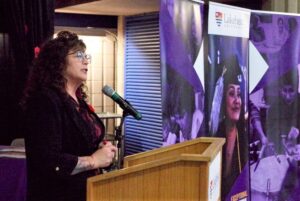Anishinabek panellists share knowledge during Lakehead University’s Languages, Land and Sovereignties/Revitalizing Indigenous Legal Orders conference

By Rick Garrick
THUNDER BAY — Fort William Councillor Michele Solomon, York University assistant professor Alan Corbiere, and Indigenous lawyer Tracey O’Donnell recently shared their knowledge at Lakehead University’s Bora Laskin Faculty of Law Languages, Land and Sovereignties/Revitalizing Indigenous Legal Orders conference.
Solomon participated in the Land Based Learning panel along with Fort Albany Elder Edmund Metatawabin and Bora Laskin Faculty of Law assistant professor Larissa Speak; Corbiere participated in the Languages panel along with Kiiwetinoong MPP Sol Mamakwa and University of Lethbridge assistant professor Don McIntyre; and O’Donnell participated in the Self-Governance panel along with Osgoode Hall Law School associate professor and associate dean (students) Karen Drake and University of Manitoba law professor Brenda Gunn on the second day of the Jan. 26-28 conference.
“[The Land Based Learning panel] was a really well-rounded discussion in that Elder Metatawabin spoke about the historical relationship and role and responsibilities,” Solomon says. “I talked more about the impacts of the colonial relationship and the treaty and how that impacted our relationship with land from a Fort William First Nation perspective, and then Larissa talked about land-based learning and … gave positives about it based on one of Lakehead University’s recent land-based learning camps.”
Solomon says it was important to provide Indigenous perspectives to the law students at the conference because many of them will be addressing matters specific to Indigenous people during their law practice after graduation.
“So it’s really important information for them to have an understanding of not just the laws pertaining to the people that they will represent but also have an understanding from an Indigenous lens on the relationship to lands and how the laws pertaining to Indigenous people have impacted their lives,” Solomon says.
Solomon says the law faculty and students she spoke with after the panel appreciated the knowledge and information she had shared about the lands taken from her community.
“It’s not just talking about treaty, it’s talking about neighbourhoods they may have lived in or neighbourhoods they grew up in in Thunder Bay and they’re on that land as a result of historical land-takings at Fort William First Nation,” Solomon says. “These are land-takings that happened after the signing of the treaty, so it also speaks to the relationship with the Crown and how even though we have this treaty agreement, the Crown continued to push us into smaller and smaller parcels of land.”
Corbiere, a M’Chigeeng citizen, says he spoke about how the Anishinaabemowin language may have been translated in treaty documents, noting that he specifically discussed the word subjects, during the Languages panel discussion.
“I just thought, how would they actually translate this because of course we don’t have a word per se, so I just talked about some [Anishinaabemowin] words that might have conveyed that,” Corbiere says.
O’Donnell, a Red Rock Indian Band citizen, says she spoke about the Ngo Dwe Waangizid Anishinaabe as a means to communicate the message on the Anishinabek Nation implementing self-government during the Self-Governance panel.
“I was talking about the Anishinabek approach to self-government and how we are relying on our inherent jurisdiction,” O’Donnell says. “Ngo Dwe Waangizid Anishinaabe is a preamble to Anishinaabe Chi-Naaknigewin, the constitution for the Anishinabek Nation. We have the authority to govern ourselves, so that was the starting point for my presentation.”
O’Donnell says there were law students in attendance at the conference from across the country, including southern Ontario and Vancouver.
“It was a great opportunity to meet with the students and share information about the work that I was doing, and showing them the connections between Indigenous law and Western law and how you can bring the two together to advance the work for Indigenous people,” O’Donnell says.
The conference also featured a keynote speaker event with Justice Patricia Hennessy on Jan. 26 and a keynote presentation by Justice Evelyn Baxter on Jan. 27.


